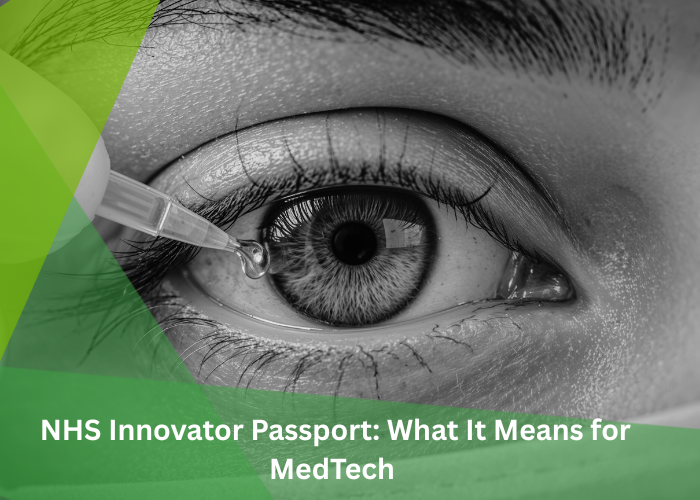The UK government has proposed a new “innovator passport” designed to simplify how medical technologies are assessed and adopted across NHS trusts in England. Today, each of the 215 trusts typically repeats its own evaluation before adopting a new device. This leads to duplicated evidence requests, long approval timelines, and inconsistent access to innovation.
Under the new system, evidence accepted by one trust could be recognised nationally. This is intended to reduce administrative burden, support faster access to proven technologies, and enhance the NHS’s long-term efficiency goals.
For suppliers of essential clinical tools, including TRITEMP™, TriMedika’s precision-engineered non-contact thermometer, the passport may reduce barriers that currently slow down nationwide adoption despite strong performance and regulatory compliance.
What Is the NHS Innovator Passport?
The innovator passport is a centralised framework for recognising clinical assessments carried out by an NHS trust. Once a device has been evaluated and approved in one location, the supporting data can be reused by other trusts, eliminating unnecessary repetition.
This approach is designed to create a more consistent, faster, and clearer pathway for medtech deployment, particularly for high-use tools that support everyday patient monitoring.
- NHS England – Innovation & Improvement: https://www.england.nhs.uk/ourwork/innovation/
- Gov.UK – Innovator passports: https://www.gov.uk/government/news/innovator-passports-set-to-accelerate-cutting-edge-nhs-care
Why the Passport Is Being Introduced
1. Reducing Administrative Duplication
Trusts currently request similar documents in different formats from suppliers. The passport means suppliers only need to submit validated evidence once.
2. Improving Access to Innovation
Many technologies achieve adoption in one or two regions but take years to scale nationally. A shared approval pathway supports faster rollout.
3. Supporting NHS Efficiency Goals
The passport is part of a wider 10-year plan to modernise the NHS by cutting delays, reducing costs, and streamlining procurement processes. NHS 10 Year Plan
What This Means for MedTech Suppliers
For device manufacturers, including those producing high-volume, high-reliability tools, the passport could deliver significant advantages:
- Shorter adoption timelines
- Reduced administrative workload
- Greater national consistency
- Improved access across multiple NHS trusts
- Less duplication of clinical evidence submissions
Implications for Non-Contact Thermometers and Infection-Control Devices
Non-contact thermometers already play an important role in hospital infection prevention strategies by removing the need for probe covers and reducing physical contact during routine observations.
With the innovator passport, once a trust confirms the performance and safety of a device like TRITEMP™, other trusts may accept the same evidence rather than undertaking new evaluations. This can reduce administrative workload and accelerate the availability of high-accuracy tools that support standardised clinical workflows.
Ensuring Safety, Regulation, and Compliance
NHS leaders have emphasised that the passport does not replace crucial governance steps. Trusts will continue to require:
- CE or UKCA regulatory compliance
- Full clinical safety evidence
- Data protection and cybersecurity assurance
- Adherence to NHS medical device standards
- Local digital capability for deployment
This means faster adoption – but without compromising care standards.
- MHRA Medical Device Regulations: https://www.gov.uk/government/collections/mhra-guidance-on-medical-devices

Benefits for NHS Trusts
1. Faster Access to Proven Technology
Trusts can adopt validated devices sooner, improving consistency in patient care.
2. Reduced Admin for Procurement Teams
Shared assessments reduce repeated document requests and shorten internal review cycles.
3. Support for National Standardisation
A unified approach helps create comparable device performance across regions.
4. Improved Allocation of Clinical Resources
Less paperwork means more staff time can be spent on frontline care.
What This Means for the Future of MedTech in the NHS
If implemented effectively over the next two years, the innovator passport could transform the way new medical devices reach the frontline. Faster, evidence-based adoption will support:
- Stronger NHS–industry collaboration
- More responsive procurement processes
- Greater confidence in proven technologies
- A reduction in unnecessary administrative spending
- Better patient access to robust clinical tools such as TRITEMP™
FAQs
What is the NHS Innovator Passport?
A national framework allowing NHS trusts to recognise assessments completed by another trust, reducing repeated evaluations for medical devices.
Does this replace medical device regulations?
No. CE/UKCA marking and all clinical safety requirements remain mandatory.
Will TRITEMP™ be eligible?
Devices like TRITEMP™, which already hold regulatory approvals and are in use in multiple trusts, could see simplified adoption through shared evidence pathways.


